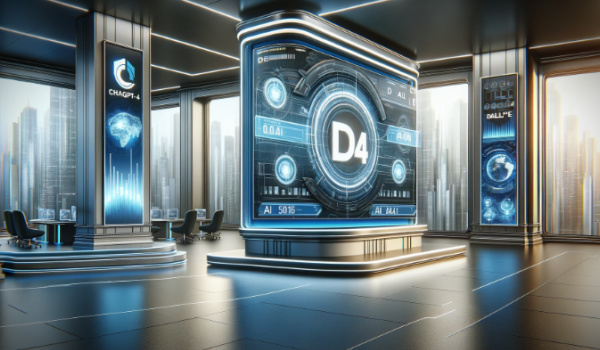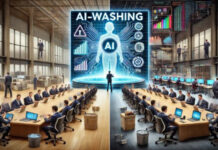At this point in our history (and news cycle), who HASN’T heard of ChatGPT, the conversational AI platform revolutionizing the world as we know it?
 Yet, we wondered if many of our readers knew the full history behind its parent organization OpenAI. In fact, did you know that Elon Musk was initially involved in this directive?
Yet, we wondered if many of our readers knew the full history behind its parent organization OpenAI. In fact, did you know that Elon Musk was initially involved in this directive?
Each week we delve into new topics in our AI EDUCATION series, and this week – with the help of ChatGPT for research (we decided to leave Microsoft’s CoPilot AI out of this one!) – we delve into a specific AI-focused topic for our readers. This week, the topic is ChatGPT (and DALL-E, too!)!
CHECK IT OUT!
OpenAI, established in December 2015 by prominent figures such as Elon Musk, Sam Altman, and other Silicon Valley leaders, has been at the forefront of artificial intelligence research. Originally launched as a non-profit, its mission was to promote and develop friendly AI to benefit humanity comprehensively. In 2019, OpenAI transitioned into a capped-profit model, which allowed it to raise significant capital while adhering to its foundational ethics.
The lab has consistently broken new ground in AI technology, with its most notable achievement being the development of ChatGPT. This conversational AI model, which simulates human-like dialogue, was first released in November 2022 based on the GPT-3 architecture. Its design enables it to understand and generate human-like text by predicting subsequent words in sentences, given all the previous words. ChatGPT has had a profound impact globally, finding applications in fields ranging from education, where it can tutor students, to customer service, where it enhances consumer interaction.
In March 2023, OpenAI introduced ChatGPT-4, which marked a significant upgrade over its predecessors. This version expanded capabilities include better understanding of nuances in complex instructions and producing more detailed and contextually appropriate responses. It demonstrates near-human performance in professional and academic applications and can generate summaries, explain code, and even create content in various formats like essays, poetry, and technical reports. This iteration signifies a leap forward in the model’s functionality, showcasing a broader understanding and more creative output capabilities.
The team at DWN now regularly researches information thru ChatGPT-4 for its articles. We hvae found a few anomalies, since the AI’s can still periodically “hallucinate” information, a topic we covered in a prior article in our education series. However, once the information produced by ChatGPT-4 is confirmed by an actual human (that would be me, Cindy Taylor, in this case), it’s pretty awesome. And it really trumps traditional search methods, so it is definitely rapidly changing the way we process information as humans.
Another significant innovation from OpenAI is DALL-E, a specialized AI for generating images from textual descriptions introduced in January 2021. This model can create detailed and coherent images that blend concepts in novel ways, proving invaluable in creative sectors such as graphic design and digital marketing.
 Digital Wealth News and AI & Finance often use DALL-E now to develop original images to accompany our content. While it seems to have issues inserting copy in – and getting spelling correct – we believe that the images it ultimately creates are quite remarkable. But that spelling issue – oh my. We’ve seen HAPPY BIRTHDAY spelled HAPPY BRRRRRRDAY. Another one recently (included here) – WEALTH MANAGEMENT spelled WEALTH MANAGMENT. FINANCE NEWS came out FINAANCE NEWS (as you can see below).
Digital Wealth News and AI & Finance often use DALL-E now to develop original images to accompany our content. While it seems to have issues inserting copy in – and getting spelling correct – we believe that the images it ultimately creates are quite remarkable. But that spelling issue – oh my. We’ve seen HAPPY BIRTHDAY spelled HAPPY BRRRRRRDAY. Another one recently (included here) – WEALTH MANAGEMENT spelled WEALTH MANAGMENT. FINANCE NEWS came out FINAANCE NEWS (as you can see below).
 When you then query the AI to correct the spelling it creates a new image (not the one you just loved but couldn’t use because of the mis-spelling) and often it spells a NEW word incorrectly. So there’s still quite a few issues there.
When you then query the AI to correct the spelling it creates a new image (not the one you just loved but couldn’t use because of the mis-spelling) and often it spells a NEW word incorrectly. So there’s still quite a few issues there.
OpenAI’s technologies are utilized worldwide, with millions of users leveraging these tools. The practical applications are vast, aiding everything from small-scale tasks like scheduling and reminders to complex operations such as programming and data analysis. As of 2024, OpenAI’s user base spans across various industries, including technology, education, healthcare, and entertainment.
Despite its success, OpenAI has faced ethical and societal questions, particularly regarding AI misuse, privacy, and the potential displacement of jobs. OpenAI engages with policymakers, industry leaders, and the public to address these concerns thoughtfully and proactively.
This topic has been covered extensively, most notably by Elon Musk, but it is a topic of great conern on multiple fronts, especially when it comes to cloning human voices. Many actors and singers have notably voiced their concern over the issue.
Elon Musk, one of the original co-founders, departed from OpenAI in 2018 to pursue his own AI initiatives under the umbrella of his company, then known as Twitter and later renamed X. Musk’s departure was driven by a desire to focus on AI safety and oversight, particularly to counteract the potential misuses of AI technologies.
As OpenAI continues to evolve, it remains a pillar in the AI community, driving innovation while maintaining a commitment to ethical development and deployment of AI technologies. ChatGPT and DALL-E are just two examples of how AI can enhance and transform various aspects of work and daily life, highlighting OpenAI’s role in shaping the future of technology.
In summary, OpenAI stands as a beacon of progress in the AI landscape, pushing forward with cutting-edge research and transformative technologies like ChatGPT and DALL-E. These tools not only demonstrate the capabilities of advanced machine learning but also open new avenues for creativity and efficiency across multiple sectors. As AI becomes increasingly integrated into our lives, OpenAI’s work will undoubtedly influence countless aspects of our society and economy.
ChatGPT and DWN Staff








